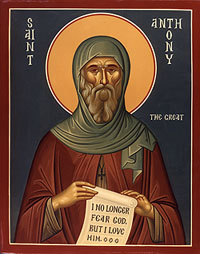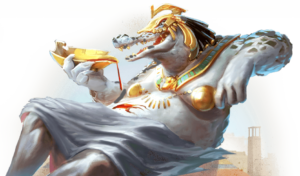In my last article we went through the primary deities of the desert pantheon and now, in this month’s installment, we’ll meet the last four! Now these deities are not quite the same as the last four. Each of them is an aspect of the god Tumeken and of the 7th (very low in divine power) Godhood tier. Most of what we know of their origins can be learned from the lore piece called “Tumeken’s Dream” translated by our friend Reldo from the Varrock Library. In this tome, we see four instances of Tumeken offering a piece of his divine essence to a creature that displayed a quality that Tumeken deemed honorable in some way and thus gifted them with a strange divinity. These four instances manifested in the beings now known as Het, Crondis, Apmeken, and Scabaras.
Het
Not much interaction is had between Het and the player excepting the newest Menaphos quests, but we do see him being worshipped all over the desert. Specifically, he is the founder of the (in)famous Duel Arena just north of Al Kharid. Het was originally a man of physical prowess who held open the mountain pass near Al Kharid by his sheer strength. For his near physical perfection, Tumeken blessed him with his essence.

Apmeken
The goddess of “social pleasures” was made so as a result of her encounter with Tumeken after he had witnessed two people groups in fierce conflict with one another. Leaving this strife behind, Tumeken stumbled upon a group of apes at play, all playing and having fun with one another. The one that would become Apmeken even climbed upon Tumeken’s shoulders, inspiring Tumeken to offer his third gifting. Apmeken is one of the central focuses in the quest Do No Evil wherein the player character learns that Amascut stole Apmeken’s voice, sight, and hearing to create Leeuni, Ayunia, and Eruni. These aspects were then used to kill of all but a few of the desert monkeys, as the Three Wise Monkeys escaped to Ape Atoll to live in peace. After the player kills these three aspects, Apmeken is restored her senses and thanks the player.
Crondis
I seem to always have an issue mixing up Marimbo and Crondis… two beefy goddesses with strange forms and exotic homelands…
But this is about the big crocodile lady, not the monkey. Crondis, as you might be able to tell, was originally a crocodile from the swamps near Ullek. Because Tumeken had just witnessed gross examples of gluttony, the crocodile being resourceful and not wasteful was refreshing to Tumeken, and worthy of his essence by his own estimation. Thus, Crondis is supposed to be the goddess representing modest living, one who would not live above what is needed.
Scabaras
And finally we come to Scabaras, the insect-humanoid figure of the lesser deities. Like the three before him, Scabaras became as we know him today through Tumeken’s gift. However, unlike the others, there is debate as to which tale of his coming to godhood is actually true. The first states that this occurred as Tumeken’s final deifying act when his wanderings through the desert left him heated and parched to the point of desperation when he came upon a tunnel which offered him cool and a chance to recuperate. In the tunnel he found a small scarab burrowing away in isolation and, for some reason, Tumeken saw this as admirable. The second origin story for Scabaras claims that the god was created as an accident incurred by Tumeken having a nightmare during a period of deep isolation. Lastly is the position held by Scabarites, who believe that Scabaras was actually and physically created by Tumeken himself after his first three attempts to create a god had appeared to be unsatisfactory.

Scabarites, the followers of Scabaras, bear a striking resemblance to both Eastern religiosity as well as ascetic monasticism developed by early Christians of the Middle East who would practice intentional poverty and isolation, preferring meditation and fasting over the comforts of the world. Scabarites typically are transformed as a gift of their faith on their way towards a state of enlightenment into a scarab/humanoid hybrid figure in order to more resemble the god of their worship. For some reason (again somewhat debated) the Scabarites and possibly the god himself have been banished from Kharidian lands and now take up residence in desert burrows and in the swamps near Ullek.
So hopefully this offers a bit more clarity as to exactly who is involved in the desert pantheon of gods and what they’re primarily all about. Hopefully these deities can receive all the more attention in the upcoming years with a new city in place to offer new possibilities for quests and lore!
Alex’s Analysis – Sun’s Shining on a New Day
posted by Alex 43 on 12th June 2017, at 3:08am | Discuss ArticleAlex’s Analysis – Don’t Desert the Desert!
posted by Alex 43 on 26th January 2013, at 1:15am | Discuss ArticleAlex’s Analysis – Missing My Mummy Quest
posted by Alex 43 on 23rd May 2009, at 10:13pm | No CommentsNext Page »



